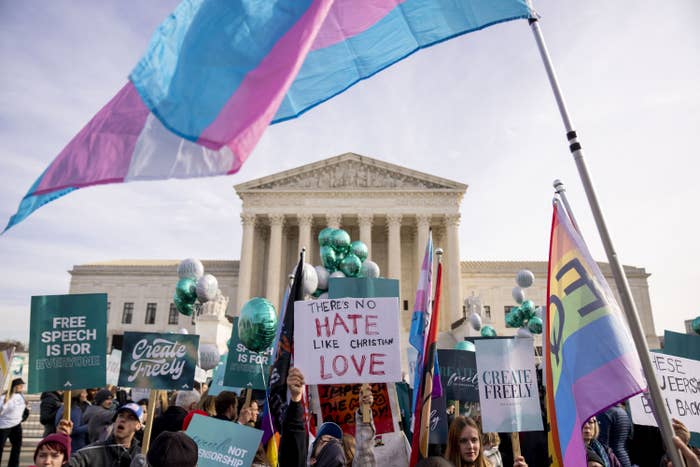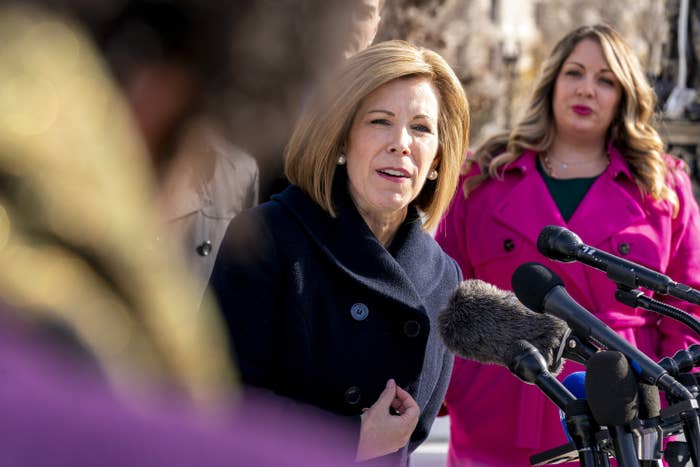
Should a designer, based on their religious objections, be allowed to refuse to make a website for a same-sex couple’s wedding?
That was the question that the Supreme Court justices grappled with on Monday during oral arguments in 303 Creative LLC v. Elenis, a case involving a Colorado web designer who says her state’s antidiscrimination law would compel her to create speech that contravenes her Christian beliefs.
In more than two hours of arguments about the line between when an artist or vendor is expressing themselves or simply providing a service to the general public, the justices quizzed lawyers for Lorie Smith over whether her web design services amounted to her potentially endorsing a same-sex marriage.
Conversely, attorneys representing Colorado and the federal government argued that allowing Smith’s claim to succeed would open other avenues for vendors to discriminate against broad swaths of the public.
“How about people who don't believe in interracial marriage? Or about people who don't believe that disabled people should get married?” Justice Sonia Sotomayor asked Smith’s attorney Kristen Waggoner. “Where's the line?”
The dispute centers on a Colorado public accommodation law that the court had previously considered in 2018 when a baker refused to make a custom wedding cake for a gay couple. In that case, the justices mostly punted on the central clash between religion and civil rights by instead issuing a narrow ruling that the baker had been treated with hostility by the Colorado Civil Rights Commission.
In Monday’s case, Smith had not yet turned away a specific couple but was instead arguing preemptively that the law would prevent her from doing so.
Waggoner, the attorney, sought to frame the case not as one about Smith denying service to a particular class of individuals, but instead about the government forcing her to speak in favor of something she objects to. Smith has had LGBTQ clients in the past, Waggoner noted, but she now would not make a website for such a couple’s wedding.
Similarly, Wagonner said, if a heterosexual couple met while married to other partners and wanted their guests to know they had found love while being adulterous, Smith should be free to refuse to create a website for them.
“Compelled speech crushes the speaker’s conscience, and it is the tool of authoritarianism, which is why this court has never allowed it,” said Waggoner, the CEO and president of the religious legal group Alliance Defending Freedom.

In Monday’s hearing, the court’s conservative majority appeared to be sympathetic to Smith’s claim that the First Amendment protected her right not to speak as an artist if it violated her religious beliefs. However, they appeared to be searching for ways to once again narrow their ruling so as not to upend antidiscrimination laws nationwide.
“This is not a hotel, this is not a restaurant, this is not a riverboat or a train,” Justice Clarence Thomas said as he tried to distinguish the case from prior ones involving civil rights. “I'm interested in the intersection of public accommodations law and speech.”
The hearing came amid fears in the LGBTQ community that the court might seek to unwind LGBTQ rights much like it did this year with abortion protections. In response, Congress is poised to pass a fail-safe law that would protect marriage equality. The bill won’t force states to grant wedding licenses to same-sex couples, but it would make clear that the federal government would recognize any married couple’s legal rights, benefits, or protections, even if they lived in a state that outlawed marriage between same-sex partners.
Speaking in an exchange with Colorado Solicitor General Eric Olson on Monday, Sotomayor tried to signal the alarm bells about the potential ramifications of the court’s decision.
“This would be the first time in the court’s history that it would say that a business open to the public … could refuse to serve a customer based on race, sex, religion, or sexual orientation, correct?”
“Yes,” Olson responded.
